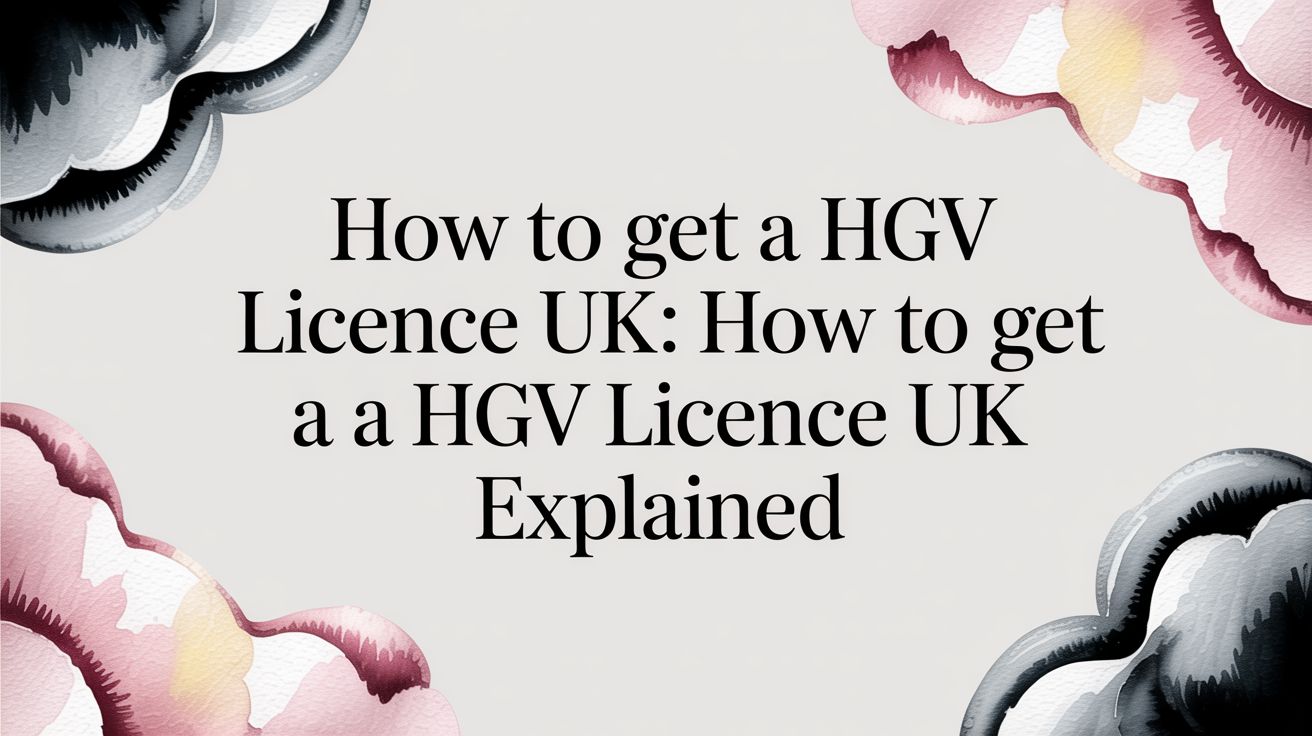Related Articles

09/01/2026
How to Become an HGV Driver in the UK

08/01/2026

Obtaining a Heavy Goods Vehicle (HGV) licence is an important milestone for anyone looking to pursue a career in the transport industry. Alongside practical driving skills, passing the theory test is a crucial step towards acquiring an HGV licence. In this comprehensive guide, we will walk you through everything you need to know about the theory test for HGV licences, ensuring you are well-prepared to tackle it successfully.
Before delving into the theory test, let’s start with a brief overview of HGV licences. HGV licences allow individuals to operate commercial vehicles that exceed certain weight limits. There are different categories of HGV licences, each corresponding to a specific vehicle type and weight range. These categories include C1 licence, Cat C licence & C+E licence:
It’s important to identify the specific HGV licence category that aligns with your career goals and vehicle requirements.
The theory test is designed to assess your knowledge of road safety, traffic regulations, and hazard awareness. It consists of two parts: multiple-choice questions and hazard perception. To be eligible for the theory test, you must hold a valid provisional HGV licence and be at least 18 years old. Additionally, you’ll need to pass the Driver Certificate of Professional Competence (CPC) theory test if you’re pursuing a career as a professional driver.
Proper preparation is the key to success in any test, and the theory test for HGV licences is no exception. Here are some essential steps to help you prepare effectively:
The Highway Code is a comprehensive guide to road safety and traffic regulations in the UK. It covers a wide range of topics, including road signs, speed limits, and vehicle maintenance. Familiarise yourself with the Highway Code to gain a solid understanding of the rules and regulations that will be tested in the theory test.
To enhance your preparation, consider investing in study materials specifically tailored for the HGV theory test. These materials typically include practice questions, mock tests, and explanations of key concepts. They can help you become familiar with the test format and identify areas where you may need additional study.
Practice makes perfect! Take advantage of mock tests and practice questions to simulate the actual test environment. This will help you become more comfortable with the test format and improve your time management skills. Additionally, mock tests allow you to identify any gaps in your knowledge and focus on areas that require further study.
The theory test for HGV licences covers a range of topics. Here are the main areas you should focus on during your preparation:
Road signs play a crucial role in ensuring road safety. Understanding their meanings is essential for all drivers, particularly HGV drivers who navigate large vehicles on the roads. Learn about the different categories of road signs, including warning signs, regulatory signs, and informational signs. Familiarise yourself with common road signs that are relevant to HGV drivers, such as those indicating weight restrictions or height limitations.
Having a sound knowledge of traffic regulations and laws is essential for HGV drivers. Study topics such as speed limits, overtaking rules, right-of-way regulations, and prohibited manoeuvres. Understanding and adhering to these regulations will help you drive safely and responsibly on the roads.
Ensuring the safety of your vehicle and its proper maintenance is crucial for HGV drivers. Study the requirements for conducting daily vehicle checks, including inspecting tires, brakes, lights, and mirrors. Familiarise yourself with secure loading practices and weight restrictions to ensure that your cargo is safely transported. Additionally, learn about the safety equipment that should be present in your vehicle and the emergency procedures you should follow in case of an incident.
Developing hazard perception skills is vital for HGV drivers, as they often encounter challenging road conditions and potential hazards. Practice recognizing and responding to hazards promptly. The hazard perception part of the theory test involves watching a series of video clips and identifying potential hazards. Improve your hazard awareness by observing your surroundings, anticipating potential risks, and responding appropriately.
Once you feel confident in your preparation, it’s time to book and take the theory test. Here’s what you need to know:
Visit the official website of the Driver and Vehicle Standards Agency (DVSA) to book your theory test. You’ll need to provide your details, preferred test location, and pay the required fee. Make sure to book well in advance to secure your preferred test date and time.
The DVSA has numerous test centres across the country where you can take your theory test. Choose a centre that is convenient for you and offers suitable test dates. Consider factors such as travel distance and availability when making your selection.
On the day of your theory test, arrive at the test centre with all the necessary documents, including your provisional HGV licence and any other identification required. Follow the instructions provided by the test centre staff and maintain a calm and focused mindset. Remember to take breaks and stay hydrated to keep your concentration levels high throughout the test.
Passing the theory test requires careful preparation and a solid understanding of the topics covered. Here’s what you need to know:
To pass the theory test, you need to achieve the minimum pass mark set by the DVSA. The multiple-choice section has a total of 100 marks, and you must score at least 85 to pass. In the hazard perception section, you need to achieve a score of at least 67 out of 100 to pass.
After completing the theory test, you will receive your results on the same day. If you pass, congratulations! You can proceed to the next steps in obtaining your HGV licence. In case you don’t pass, don’t be disheartened. Take note of the areas where you struggled and dedicate additional study time to improve your knowledge.
The theory test certificate is valid for two years. This means that you must pass your practical driving test and obtain your HGV licence within this period. If the two-year validity period expires, you will need to retake the theory test.

09/01/2026

08/01/2026
Complete the form below and we’ll contact you asap.

